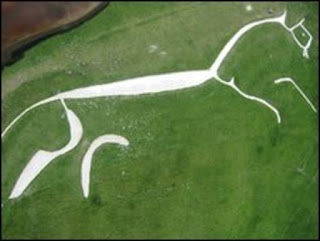June reading, Part III: extra bonus post!
Here we are with some bonus reading....
The Scouring of the White Horse, by Thomas Hughes: History? Novel? What is this thing? This 1859 publication is a novelization of Hughes' actual attendance at the 1857 scouring of the Uffington White Horse, which also serves as a sort of summary of what was then known about the chalk figure, and the history of its maintenance. Reading it was a slightly odd experience because I thought it was supposed to be a simple account of the customs around the figure, commissioned by the heads of the nearby towns, but it reads like a novel, complete with the narrator deciding to take his annual two-week holiday at a friend's farm and falling in love with the friend's sister.Apparently Thomas Hughes, better known as the author of Tom Brown's School Days, came from the area around Uffington. Maybe this explains it. In the novel, while he's staying with his friend, he attends this scouring event and gets talking with an antiquarian-minded vicar, who tells him all the best historical information about the horse figure -- that it was carved into the hill to commemorate AEthelred and Alfred the Great's victory over the Vikings at the Battle of Ashdown in 871. We go through three different candidates for the location of Ashdown. Then the narrator attends the games and contests, deliberates with friends about whether boxing matches are in keeping with the desired spirit of the event, enjoys the downhill race for a cheese, and gathers old Berkshire ballads in the refreshment tent. Copious attending notes give more historical context and a sermon.
So it's an oddball kind of a novel, but quite interesting -- although scholars have now shown that the horse figure is in fact a good deal older than the Saxons, about 3000 years old in fact. I ran across it because I've been sort of collecting books about neolithic monuments in England, and walking trips, with the Ridgeway as a focus. My hope is to walk the Ridgeway myself sometime, and the Uffington White Horse is right on the Ridgeway. So when I saw it mentioned in that context, I hopped over to archive.org and got myself a copy. This always gives rise to mixed feelings; on the one hand, archive.org is the greatest, and gives me incredible access to so many things that would be unobtainable otherwise! On the other, I sure would like to have a proper bookshelf dedicated to this subject that I could look at and feel smug about, and what I've mostly got is digital. Which I'm lucky to have.
Gone Away and The Cruellest Month, by Hazel Holt (Mrs. Malory mystery series): Slightly Foxed recommended this mystery series by Hazel Holt. Mrs. Malory, widow, somewhat intellectual, and resident of an Exmoor village near the seaside, gets involved in mysteries and lets her imagination go. These are set in the mid to late 80s. In Gone Away, an old school friend who is now in big business in the US returns and plans to marry an attractive but unlikeable widow. When she disappears, he asks Mrs. Malory to investigate for him. The Cruellest Month has her spending a week in Oxford, researching at the Bodleian for an article. One of the librarians is the son of an old friend, and he has just had the harrowing experience of finding an elderly volunteer dead, crushed by a falling bookcase. Is it an accident or murder? She was an unpleasant woman who enjoyed holding old secrets over people's heads...I enjoyed the first one, and loved the library setting of the second, but found certain elements of the story rather difficult to like. I'll probably continue, though!
The Untold Story, by Genevieve Cogman: I've been saving the final volume in the Invisible Library series for a treat. Irene is reeling from the news she got in the last story, and her arch nemesis Alberich keeps sending her messages about the Library, insisting that there is something wrong going on there. Has he maybe got a point? Where did the Library come from anyway, and who runs it? Even the elders seem to get orders from higher up. With her friends -- one dragon, one fae, and one regular if super-intelligent human -- Irene sets out to solve the final mystery.I found this to be a satisfying ending to the series; lots of excitement, but in a meaningful way that actually led to a solution. Good stuff.







What parts of the mysteries did you not enjoy? I'm trying to read more mysteries, and these sound fun but I'd also like to be prepared.
ReplyDeleteOh, there was a bit near the end where a character did something I thought was just cruel -- mentally, not physically. More accurately, cruelly revealed a long-past deception. Try the first one, Long Gone, and see what you think!
Delete